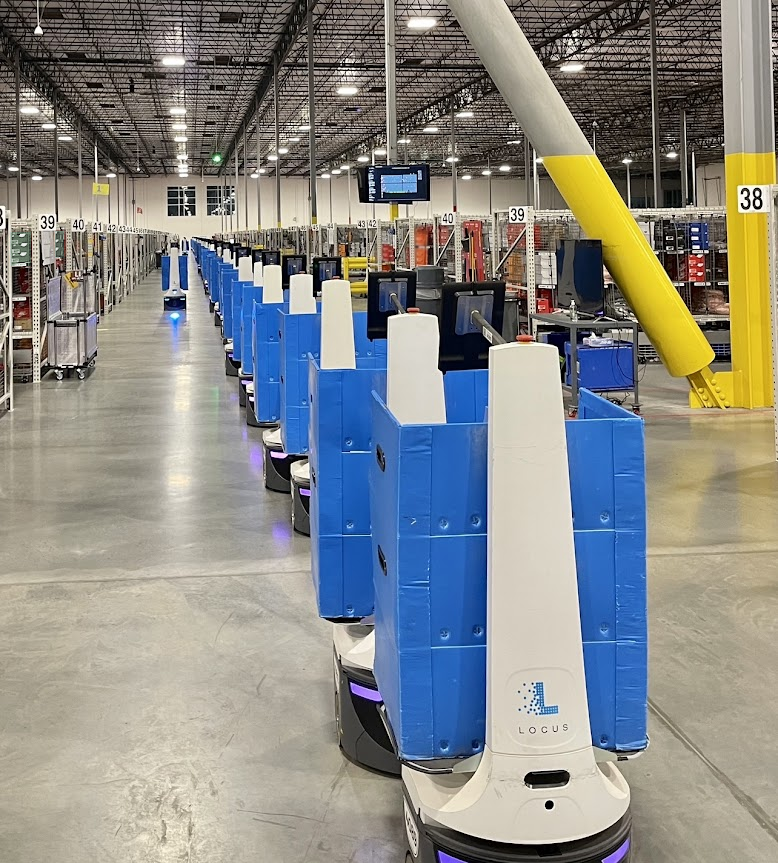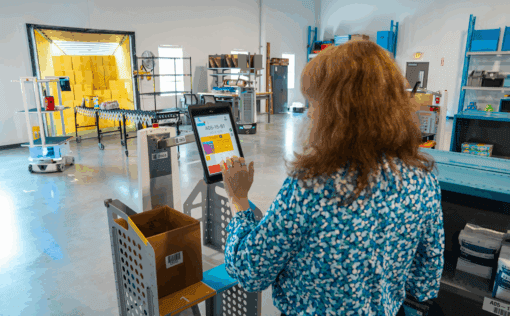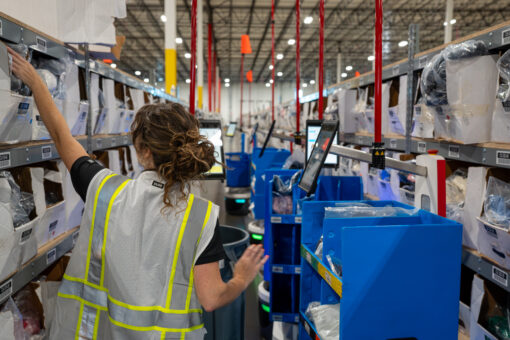WP: How to achieve 400 UPH with Locus Fast Pick
WP: How to achieve 400 UPH with Locus Fast Pick Download Now!
How to Use AI in Your Supply Chain: Unlocking Efficiency and Mitigating Risks
Kary Zate, Sr. Dir. of Marketing Communications

In today's fast-paced and interconnected business landscape, companies face numerous challenges in managing their supply chains effectively. From the need for precise demand forecasting to disruptions caused by unforeseen events, businesses must stay agile and proactive to remain competitive. This is where artificial intelligence (AI) emerges as a potentially powerful tool, offering the potential to revolutionize supply chain operations.
As we delve into the world of AI in supply chains, it becomes clear that embracing this technology is crucial for organizations striving to stay ahead in an increasingly complex and competitive business environment. By adopting AI, businesses can unlock operational efficiencies, mitigate risks, and position themselves for sustained success in the future.
AI can help companies navigate through the complexities of supply chain management to gain valuable insights, optimize processes, and make data-driven decisions. From understanding disruptions and identifying bottlenecks to revamping the global supply chain, AI can drive efficiency, reduce costs, and enhance customer satisfaction.
However, even with the many benefits of AI, implementing it in the global supply chain still requires overcoming challenges related to data quality, integration, privacy, legislation, and regulation.
The Data-Driven Benefits of AI in the Supply Chain
AI can play a crucial role in helping companies understand supply chain disruptions and identify bottlenecks or future challenges. For example, AI can analyze vast amounts of data from various sources to identify patterns and trends, providing more accurate demand forecasts.
AI can help companies analyze data related to suppliers, transportation routes, geopolitical events, natural disasters, and other relevant factors, to identify potential risks and provide recommendations for mitigating them. AI algorithms can also simulate and optimize complex supply chain operations to allow companies to make data-driven decisions and anticipate potential challenges, monitor supplier-related risks, and provide recommendations for alternative suppliers or mitigation strategies.
Overall, implementing AI in supply chains can lead to increased operational efficiency, cost savings, improved customer service, risk mitigation, and the ability to “look forward to anticipate trends and changing market dynamics. It empowers companies with data-driven insights and capabilities to make informed decisions, optimize processes, and stay competitive in today's dynamic business landscape.
Leveraging AI has the potential to give you a look ahead, significantly helping demand forecasting and planning. AI-driven algorithms help companies make data-driven decisions like these to improve efficiency, reduce transportation costs, and enhance on-time deliveries:
- When and how much to order
- Optimized route planning
- Enhanced load balancing
- Smart labor allocation
- The right delivery scheduling
AI-powered systems provide real-time visibility into the supply chain, actively collecting and analyzing data from multiple sources. AI-powered predictive maintenance models can monitor equipment and machinery in real-time, analyze sensor data and historical patterns to identify potential failures or maintenance needs to prevent costly disruptions in the supply chain. AI can also facilitate collaboration and coordination among supply chain partners, promoting transparency, efficiency, and agility in the global supply chain network.
Steps to Take to Assess AI Technology
- Educate yourself. Research and analyze how AI is being used in your industry and similar businesses and identify business challenges and pain points within your organization or industry that could potentially be addressed by AI.
- See if you are ready. Determine if your organization has the necessary infrastructure, resources, and data availability to support AI initiatives.
- Evaluate the costs. Assess the potential costs associated with implementing AI, including technology acquisition, infrastructure setup, data preparation, talent acquisition or upskilling, and ongoing maintenance.
- Make a plan. Start small and experiment and collaboratively develop a roadmap for AI adoption that aligns with your organization's strategic goals, resources, and capabilities.
- Look to the pros. Seek expert advice. Understand that AI is an evolving field, and technologies and best practices are continuously advancing.
The Risks of Not Using AI
Choosing not to explore and utilize AI in your operations can have several short- and long-term risks. First, companies that do not explore and utilize AI may limit their ability to extract meaningful insights from the growing volumes of data they generate and result in suboptimal decision-making, missed opportunities, and an inability to respond effectively to changing market dynamics. AI can help identify and mitigate risks within the supply chain, such as supplier disruptions, quality issues, or delivery delays. By not leveraging AI, companies may struggle to engage customers effectively, leading to decreased customer satisfaction and retention rates.
Lastly, companies that do not embrace AI risk being left behind as new business models, technologies, and customer expectations emerge. They may find it challenging to adapt to future trends and disruptions, putting their long-term sustainability at risk.
About the Author
Kary brings more than 25 years of B2B and B2C product, software, and technology marketing, public relations, and communications expertise to drive the strategy and execution of Locus’s communications. He has developed successful and engaging integrated marketing programs for startup companies as well as global Fortune 500 companies, reaching enterprise customers, industry partners, analysts, and investors. Kary holds a Bachelor of Arts degree in Communications Arts and Sciences from Michigan State University.




